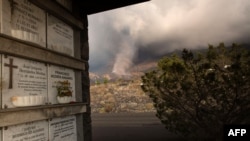Fresh volcanic eruptions in Spain's Canary Islands prompted the cancellation of flights, airport authorities said Friday, the first since the Cumbre Vieja volcano came to life again.
New evacuations were also ordered as large explosions and new openings were reported at the volcano on La Palma island on Friday.
A large cloud of thick, black ash spewed into the air, forcing several airlines to call off flights.
La Palma had six inter-island flights scheduled for Friday operated by Binter, Canaryfly and Air Europa, while the national carrier Iberia had a single service from Madrid to the mainland. All were scrapped.
They were the first flights to be cancelled since the volcano erupted on Sunday.
"It is not yet possible to say when we can resume flights," Spanish carrier Binter said on Twitter.
Authorities also ordered new evacuations, adding to the 6,100 people already forced to leave to area this week, including 400 tourists.
The compulsory evacuation order was issued in parts of El Paso town on La Palma island "given the increased risk for the population due to the current eruptive episode," the regional government said.
According to the European Union's Copernicus Earth Observation Program, the lava has so far destroyed 390 buildings and covered more than 180 hectares of land.
Video footage from the civil guard showed a garden in the area completely covered in thick ash.
Visiting the island, Prime Minister Pedro Sanchez announced La Palma would be declared a zone affected by a catastrophe" which opens financial aid to residents.
Toxic gas fears
The speed of the lava flowing from the mouth of the volcano has steadily slowed in recent days, and experts are hoping it will not reach the coast.
If the molten lava pours into the sea, experts fear it will generate clouds of toxic gas into the air, also affecting the marine environment.
Authorities set up a no-go zone this week to head off curious onlookers.
No casualties have been reported so far but the damage to land and property has been enormous, with the Canaries regional head Angel Victor Torres estimating the cost at well over $470 million.
The eruption on La Palma, home to 85,000 people, was the first in 50 years.
The last eruption on the island came in 1971 when another part of the same volcanic range -- a vent known as Teneguia -- erupted on the southern side of the island.
Two decades earlier, the Nambroque vent erupted in 1949.




